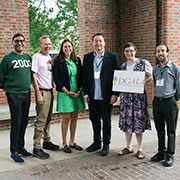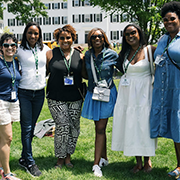Designing a Career—and a Life—with Purpose
A Q&A with Joe Catrino, executive director of Dartmouth’s Center for Career Design, on helping students unlock their potential, explore new paths, and embrace life design.

Jun 5, 2025
6 minute read
Courtney Hall
6 minute read
As the workforce and world evolve, so must the way students prepare for life after Dartmouth. We spoke with Joe Catrino, executive director of the new Center for Career Design, about how the College is rethinking career development. Through life design principles and a more personalized, exploratory approach, the center will help students better understand themselves, discover unexpected career possibilities, and create intentional plans for their futures.
On the Life Design Approach
What is the DCCD's goal for students, and how does it differ from past initiatives?
I think what we’re doing is rather unique. We’re aiming for a more personalized approach to their careers. Our goal is to help students to better understand who they are through coaching. In the past, we have acted as career advice generalists. We need to shift toward helping students better understand who they are. What’s most important to them? What do they want to achieve, and more importantly, why? We aim to help them clearly communicate their goals, understand why they have those goals, and help them to explore ideas they might not have considered.
How do you plan to guide students through their career development?
We’re integrating life design by interviewing students about their interests, likes, dislikes, strengths, and weaknesses. By engaging students in ongoing conversations, we will help them to articulate their thoughts and start making informed decisions about their careers. We also want to expose them to paths they might not know about, because students often don’t realize what options are out there. For example, they might think that majoring in a specific field limits their career choices, but with a liberal arts education, they have the skills to pursue a variety of industries.
How does a Dartmouth liberal arts education fit with practical career development, and how do you bridge the gap between the two?
The liberal arts education provides core competencies like critical thinking, communications skills, and teamwork, which are highly valued by employers. These skills are fundamental and transferable across industries. The DCCD’s role is to help students see how these competencies apply to various career paths.
What is life design, and how does it help students with their career paths?
Life design is a creative problem-solving approach that originated from design thinking. It involves understanding yourself, defining problems, brainstorming options, and then prototyping solutions. We use this process to help students figure out what they want in their careers. It’s about asking open-ended questions to help them reflect on their interests and skills, trying different things, and learning from failures. This process encourages students to embrace failure as a lesson, not a setback.
Can you give us an example of life design in action?
Take, for example, a student who comes to us unsure about their career path. They’re thinking about majoring in economics but aren’t fully convinced it’s the right fit for them. In a life design session, we start by asking open-ended questions to explore their motivations and interests: ‘What drives you?’ ‘What kind of problems do you want to solve?’ From there, we brainstorm a range of possibilities—maybe they’ll want to stick with economics, but we can also explore other fields of work like data science, public policy, or even social entrepreneurship.
Next, we help them prototype—perhaps they take an economics-driven internship at a finance firm, work as a researcher for a political organization, or work with a nonprofit focused on economic growth in emerging and underdeveloped markets. These experiences give them a better sense of what they enjoy and whether studying economics aligns with their skills, values, and long-term goals. At the end of the process, they may still choose economics, but now they have a clearer, more informed understanding of what that path looks like and how it fits into their larger vision for the future. They’ve learned from exploring multiple paths, and each step has brought them closer to making a decision that feels right for them.
What is the structure of the career coaching model you’re implementing?
We are setting up six career communities: Business; Creative; Government and Policy; Good and Green, which covers jobs related to sustainability and cause-based work; STEM+; and an exploratory community for students who need to zero in on their path. Each community will have specialized coaches who will provide one-on-one coaching to guide students through the life design process. We also plan to give students a chance to explore different communities if they are unsure of where they fit. Our focus is on personalizing their career journey and showing them all the possibilities they can pursue.
On the Importance of Internships
Why are internships important?
Internships are critical for several reasons. First, they provide students with hands-on experience, which helps them develop essential skills that can’t always be learned in the classroom. It’s not just about what you’re taught—it’s about the skills you build. Internships help students gain self-awareness, refine their skills, and determine what career paths they might want to pursue. Even if a student doesn’t love the internship experience, they still gain valuable insights into what they enjoy and what they don’t.
Moreover, internships are crucial for networking and professional development. They provide access to industry professionals and allow students to build relationships that can be instrumental in their career growth. Our program has the added benefit of creating connections between students and professionals from the Dartmouth network. That Dartmouth connection holds a lot of value in helping the longevity of the networking relationship.
How do you plan to address the challenges students face in securing internships, especially those who can't afford unpaid opportunities?
We want to ensure that financial constraints don’t prevent students from taking valuable internships. We’re working on a system that provides dedicated funding to make internships accessible to everyone. We believe that internships are critical for professional development and networking, and we want students to have these experiences, regardless of financial barriers. We’re also focusing on improving internship tracking to gather feedback from students and supervisors to ensure quality experiences.
Does the career development process support students considering graduate school or fellowships?
We support students considering graduate school, law school, medical school, or other advanced degrees. Through life design, we help them figure out if that’s the right path for them and guide them through the decision-making process. It's about identifying whether they need further specialization and helping them map out that next step.
Internships can also play a role in this scenario. A student might come to Dartmouth thinking they will go for a graduate degree right away. But a successful internship may help a student see how much they enjoy the workplace, or it may show them a direction that doesn’t require the degree right away. They may stick with their plan to go straight to graduate school after all, but we want to help them figure out what makes the most sense for the life they desire.
On the Role of the Dartmouth Community
What role do parents and families play in this career development process?
Parents and families are key partners. Their professional networks and experiences can be valuable for students. We’re looking to engage them more as resources, whether by offering advice, connecting students with opportunities, or simply supporting their students’ decision-making. We’ve developed a strategy for actively involving parents in the career development process.
How does Dartmouth’s D-Plan factor into career development and internships?
The D-Plan offers flexibility, allowing students to take on internships or projects during different terms. We’re looking to create more project-based internships that can be shorter in duration, which could benefit both students and employers. For example, a company might not have a full-time internship opportunity, but they might have a project that can be completed over a short time period. This flexibility allows students to explore different fields and gain valuable experience.
How can alumni get involved with supporting current students?
Alumni can be involved by offering mentorship, sharing advice, joining panels to share their expertise with students, and offering internships or project-based opportunities. Project-based internships are an alternative to traditional internships that we are excited about. This model allows busy employers or business owners to get help from a Dartmouth student on a single project, making it easier for employers to have help on mission-critical work without feeling they need an entire internship program. Dartmouth Connect is an excellent platform for encouraging alumni to stay connected with current students to find this type of match. We encourage all alumni to be active on this Dartmouth-only platform.
We can also help alumni employers and business owners understand how to work with students. Even if someone has never hired an intern before, we can help with creating an internship experience customized for the right Dartmouth student. Alumni also play an invaluable role by sharing their experiences—the good and bad—to help students understand that not all career paths are similar or linear. Alumni who have taken non-traditional career paths, endured challenging internship experiences, or learned through experience what they don’t want to do can help our students see the many paths to success.
To learn more about the Dartmouth Center for Career Design, visit their website.






